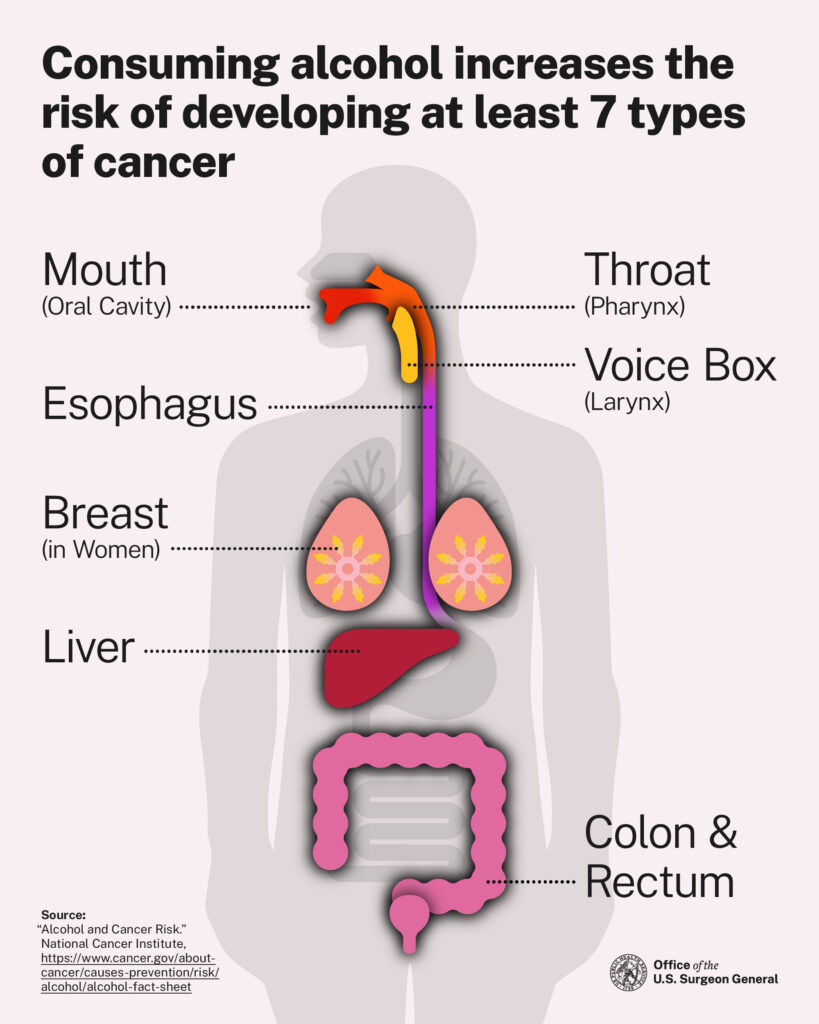When people think about the dangers of alcohol, liver disease often comes to mind first. But did you know alcohol is also a carcinogen? According to the International Agency for Research on Cancer (IARC), alcohol is classified as a Group 1 carcinogen—the same category as tobacco and asbestos. That means drinking alcohol can directly increase your risk of developing cancer.
How Alcohol Increases Cancer Risk
Alcohol affects the body in several ways that make cancer more likely:
- Alcohol Breaks Down Into Acetaldehyde. When you drink alcohol, your body metabolizes it into acetaldehyde, a toxic chemical that damages DNA and prevents cells from repairing themselves. This damage can lead to the development of cancer.
- Increases Oxidative Stress and Inflammation. Alcohol increases the production of reactive oxygen species (ROS), which causes oxidative stress and damages cells. This process creates an environment where cancer cells can grow more easily.
- Hormonal Changes (Increased Estrogen). Alcohol consumption raises estrogen levels, which can contribute to the development of hormone-related cancers, such as breast cancer.
- Inhibits Nutrient Absorption. Excessive drinking impairs the body’s ability to absorb essential vitamins like A, C, D, E, and folate, crucial for immune defense and DNA repair.
Also, despite popular myths like, red wine being healthier because it contains antioxidants like resveratrol. These compounds do not counteract alcohol’s cancer-causing effects. It’s the ethanol in all alcoholic drinks that increases cancer risk. So, the type of alcohol doesn’t matter about its cancer-link potential.

Cancers Most Linked to Alcohol
Studies have shown alcohol consumption is a leading risk factor for several cancers:
- Breast Cancer. Even one drink per day increases a woman’s breast cancer risk by 7-10% compared to non-drinkers. This is due to alcohol’s effect on estrogen levels, which drive hormone-receptor-positive breast cancer.
- Liver Cancer. Long-term alcohol use can lead to cirrhosis, scarring that drastically raises the risk of hepatocellular carcinoma (HCC), the most common type of liver cancer.
- Esophageal Cancer. Heavy drinkers have a fivefold increased risk of esophageal cancer, particularly esophageal squamous cell carcinoma.
- Colorectal Cancer. Men who consume three or more alcoholic drinks per day have a 52% greater chance of developing colorectal cancer.
- Cancers of the Mouth, Throat, and Voice Box. Alcohol damages tissues in these areas, increasing the likelihood of cancer. When combined with smoking, the risk multiplies significantly, making it 30 times higher than in non-drinkers.
Is There a Safe Level of Alcohol Consumption?
No. No amount of alcohol is completely safe regarding cancer risk. Research shows that even moderate drinking (one drink per day) increases cancer risk. The more alcohol consumed, the greater the risk.
That said, cancer risk varies based on individual factors such as genetics, lifestyle, and overall health.
While some health guidelines suggest moderate drinking (one drink per day for women and two for men), the safest choice for reducing cancer risk is to limit alcohol as much as possible.
If you choose to drink, spacing out drinks, staying hydrated, and consuming alcohol with food may reduce immediate risks. However, the cumulative effects of drinking over time still contribute to increased cancer susceptibility.
Ways to Lower Your Cancer Risk
If you’re concerned about cancer risk, consider these steps:
- Reduce or Quit Alcohol. Cutting down on alcohol can significantly lower your cancer risk. Gradually reducing intake or setting alcohol-free days can be an effective strategy. If quitting feels challenging, professional support and counseling may help.
- Choose Non-Alcoholic Alternatives. There are many alcohol-free beers, mocktails, and other beverages that offer social enjoyment without the associated health risks. Experimenting with alternatives can help make the transition easier.
- Prioritize Cancer Screenings. If you drink regularly, talk to your doctor about early screening for alcohol-linked cancers. Regular screenings can help detect cancer early when it’s more treatable.
- Adopt a Healthier Lifestyle. Eating a balanced diet rich in fruits, vegetables, and whole grains, staying physically active, and getting enough sleep can help counteract some of the negative effects of alcohol. Regular exercise reduces cancer risk and supports overall health and mental well-being.
- Build a Support Network. Surround yourself with friends and family who support healthy lifestyle choices. Finding a community or joining alcohol-free social events can make it easier to reduce drinking without feeling isolated.
The evidence is clear: alcohol consumption raises cancer risk. While occasional drinking may seem harmless, even small amounts can contribute to long-term health risks.
If you want to take control of your health, cutting back on alcohol is one of the most effective steps you can take.

